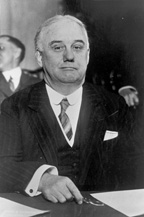William Scott Vare
William Scott Vare (born December 24, 1867 in Philadelphia , Pennsylvania , † August 7, 1934 in Atlantic City , Atlantic County , New Jersey ) was an American politician . Between 1912 and 1927 he represented the state of Pennsylvania in the US House of Representatives . He was then elected to the US Senate , where he had to give up his mandate in 1929 because of criminal activities in connection with the elections.
Career
William Vare attended public schools in his homeland and then went into commerce. In 1893 he became a building contractor with two brothers. At the same time he began a political career as a member of the Republican Party . Between 1898 and 1901 he sat on the Philadelphia City Council and between 1902 and 1912 he held the office of Recorder of Deeds there . In 1911 he ran unsuccessfully for the office of mayor of his hometown, and a year later he was elected to the Pennsylvania Senate.
After the death of Congressman Henry H. Bingham , William Vare was elected in the first constituency of the state of Pennsylvania as his successor in the US House of Representatives in Washington, DC . After several re-elections, he was able to exercise this office between May 24, 1912 and March 3, 1927. However, in January 1923 he had since resigned for reasons that have not been handed down, so that the mandate between January 2 and March 3, 1923 was vacant. On March 4th, he entered his next legislative term. During his tenure as Congressman, the 16th and 17th amendments were ratified. It was about the nationwide introduction of income tax and the direct election of US senators . The First World War also fell during this period . In addition, the 18th and 19th amendments to the Constitution were ratified in 1919 and 1920 . It was about the ban on trade in alcoholic beverages and the nationwide introduction of women's suffrage .
In 1926, Vare renounced another candidacy for the US House of Representatives. Instead, he ran for the US Senate. He won both the primary and the actual elections. Both votes were overshadowed by irregularities. He was accused of corruption and electoral fraud. The governor of his state declined to confirm the election results. The US Senate also refused to swear in Vares. His official expulsion from this body did not take place until December 6, 1929. Out of annoyance at these events, Vare later joined the Democratic Party . However, he did not make a political comeback. He died on August 7, 1934 in Atlantic City of complications from a stroke.
Web links
- William Scott Vare in the Biographical Directory of the United States Congress (English)
| personal data | |
|---|---|
| SURNAME | Vare, William Scott |
| BRIEF DESCRIPTION | American politician |
| DATE OF BIRTH | December 24, 1867 |
| PLACE OF BIRTH | Philadelphia , Pennsylvania |
| DATE OF DEATH | August 7, 1934 |
| Place of death | Atlantic City , New Jersey |

